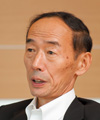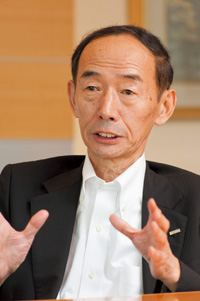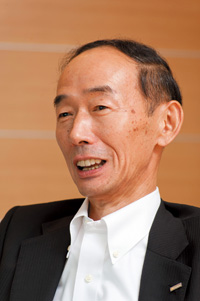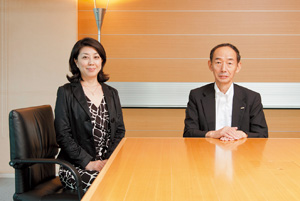 |
|
|
|
|
|
View from the Top Vol. 11, No. 10, pp. 1–4, Oct. 2013. https://doi.org/10.53829/ntr201310tp1  The Cloud as Trigger for a Global Strategy Leveraging the Strengths of a Telecom CarrierOverviewNTT Communications is taking up the challenge of creating new business under its Vision 2015 growth strategy. What kind of approach is needed to achieve true globalization in an ICT market that demands quick results? We asked President & CEO Akira Arima to tell us about current trends in the ICT market and the strategy of leveraging the strengths of a telecom carrier in the field of cloud services. Keywords: telecom carrier, cloud services, strategy Providing global and total ICT outsourcing services as only a telecom carrier can—Mr. Arima, in the three years since you took up your present position, how has NTT Communications been progressing? These last three years have been a period of transition for our business. As for sales, operating revenue for the 2012 fiscal year of the NTT Communications (NTT Com) Group could not help but fall due to a structural decrease in revenue in voice communications and a revenue drop accompanying fierce price competition in the data-network business. Unfortunately, revenue increases in cloud services and other growth fields could not cover this decrease in revenue. Although we have not been able to apply a brake to this overall decrease in revenue, we nevertheless achieved a record operating profit since the founding of the company, following the record profit in fiscal year 2011. The issue we face now is boosting our topline growth. My goal is to increase our revenues without a moment’s delay. I feel that the efforts I have made since taking up this position in greatly restructuring the company’s internal organization and making business processes more efficient are putting the company on the right path to profits. Although the things that I want to do have not in essence changed since the time that I assumed this office, the pending issue is how to create new business as a means of increasing revenues, which is the foundation for growing profits under Vision 2015. Looking forward, I will promote global and total outsourcing services befitting a telecom carrier as an opportunity for our customers to convert their information and communications technology (ICT) to the cloud under our Global Cloud Vision. —Please tell us how you plan to position and execute the Global Cloud Vision business strategy. I believe that achieving corporate growth solely on the basis of the Japanese market is very difficult. Adding the word “global” to our strategy reflects my desire to make the provision of cloud services on a worldwide basis a core strength of our company. As for the cloud, I can say that there are many diverse ways of implementing and providing cloud services, and there are many companies competing in this field. Developing services that can differentiate NTT Com from other companies is essential. For us, the cloud, in the end, is a trigger. My aim in leveraging our strengths as a telecom carrier is not simply to provide cloud services but also to provide global and total ICT services that include our networks and datacenters connected to the cloud as well as general-purpose applications, security, operations management, and other attractive services.
Demonstrating all our strengths in providing total ICT services—It would appear that safety and security are strong requirements in operating a cloud. What are your thoughts on this? As companies continue to adopt ICT at an accelerated pace, it becomes more important than ever to maintain a safe and secure network environment. For example, while a datacenter operator would ensure the reliability of the datacenter itself by securing a stable supply of power, our strength as a telecom operator would be to comprehensively provide total ICT services in a safe and secure manner. Some people probably have the idea regarding this strength that instead of a comprehensive, total provision of all services, it would be better for the customer himself to assemble a set of services from among those considered to be the best in the market in each field, such as the infrastructure, datacenter, or network field. An ICT system, however, would generally become unusable if any one of its constituent components—such as the cloud, datacenter, or network—fails. Our strength lies in our ability to provide services under an ICT system that is totally under our control. For this reason, we pay close attention to maintaining close ties between the various sections within NTT Com so that we can fully demonstrate to our customers our strength in being a one-stop provider of services. Furthermore, as a dedicated network operator, we can embed the cloud within the network, which means that we can provide a cloud connection as a free service. While other operators charge for such a connection, we can provide it for free. At present, we provide the same services in various regions around the world. We feature 146 global datacenters including those scheduled to be launched next fiscal year, and we have clouds set up in 10 bases spanning 8 countries. Moreover, to differentiate our clouds in the marketplace, we are rolling out functional enhancements such as automatic cloud migration (on-premise connection service), automatic virtual private network (VPN) connections, and integrated customer portal sites based on software-defined networking (SDN). We are also working on expanding our Wide Angle managed security service, on rolling out a new security platform (security information and event management (SIEM) engine) in 9 countries, and on setting up a security monitoring system at more than 450 locations in 14 countries. These initiatives have been highly evaluated by third-party institutions. In just this past year, for example, NTT Com received the Best Cloud-based Service and Best Asian Telecom Carrier award at the Telecom Asia Awards 2013 (held April 2013) and the Grand Prize in the Security Services section at the MM Research Institute Awards 2013 (held in June 2013). The inroads made into foreign markets by Japanese manufacturing firms and other enterprises have been truly remarkable, and we have not a few customers who obtain more than half of their profits from overseas operations. These customers are faced with a variety of issues resulting from M&A (merger and acquisition) activities with overseas companies such as the need to merge ICT systems and achieve greater operational efficiency. We are frequently receiving inquiries on whether we can provide the same quality of service overseas as in Japan and whether we can support global activities. If we cannot support our customers in these ways, we will not be able to survive. In addition, when thinking about our own transformation into a global enterprise, we will, of course, be providing services throughout the world from overseas bases, but I think that there is also a need to reform the company from inside Tokyo headquarters. One issue, for example, is the ratio of foreign employees. Ideally, there is a need for foreign representation at the executive level, but our efforts will begin with developing a multinational group of employees.
Face reality objectively and choose decisiveness over hesitation—NTT Com’s desire to globalize is understandable given the times and current trends, but moving with trends also involves some unknowns, which means that risk too must be taken into account. How do you assess risk? Work at the executive level is, in one sense, an ongoing assessment of risk. As to whether one should hold back or more forward, I think it is better to advance than to stay still once the risks have been thought out. With cloud services, for example, we were confident that there was a real need for these services after reading market trends, so we felt that it was then just a matter of matching our expertise and business model with those needs. Multinational companies in various countries around the world are now focusing on the Asia market. They’re investing in Asia as a growth strategy, but when deciding where to establish a hub, their attention is unfortunately drawn not to Tokyo but to Hong Kong or Singapore. We nearly sold out the capacity of the datacenter we launched in Hong Kong in May to customers consisting of foreign corporations. It is natural to keep in mind such data or feedback that can serve as grounds for decision making, but to promote even further growth, it is essential that on-site visits be made to collect comprehensive information as a basis for making intuitive decisions. For this reason, I see to it that we make fact-finding missions to our colleagues’ sites scattered throughout the world to hold discussions and find out what our customers really need. There is always the risk that some sort of problems will arise when expanding business, so it cannot be said that everything is going fine—there is no other choice but to deal with those problems accordingly. I believe that facing reality objectively is very important. Since we are always competing with other carriers for business, we must be able to respond to customer needs in a timely manner. The time limit for doing so is set by the market, and if we cannot propose solutions by that time, we will have achieved nothing. —What is the state of collaboration with NTT R&D (Research and Development), which supports the business of NTT Com? We are now in the process of receiving support from NTT laboratories as we convert the cloud infrastructure to a virtual network. While it might be easy to say that a “customer’s existing system should be migrated to the cloud,” doing so would normally involve lots of hard work. In contrast, our approach is to construct a virtual network between our datacenter and the customer’s system and use it to move the customer’s system directly to our cloud. This approach has received high marks from various quarters in the industry as the world’s first auto-migration system. Additionally, in the area of security services, we have developed a SIEM engine combining the know-how of NTT Com and NTT Com Security and the advanced technologies of NTT laboratories and have deployed it as a new security operations infrastructure. By adding blacklists that incorporate NTT Com proprietary know-how to this SIEM engine, we have made it possible to reliably detect and deal with security risks such as by visualizing unknown threats that have previously been difficult to detect. On the basis of these activities, we can say that without NTT laboratories we would not have these attractive cloud services to offer. I would hope that this use of research results in the business of NTT Com being a source of motivation for NTT researchers. I would like to strengthen our collaborative efforts with NTT R&D to provide products and services that draw responses such as “NTT technology is amazing” from customers around the world. Differentiating NTT Com from its competitors by automating routine tasks and eliminating operating mistakes—Mr. Arima, could you leave us with a message for all NTT Com employees? In this era in which results are needed promptly, the provision of services is meaningless if they are not provided when needed. In this regard, the services that we can provide at that time will not always satisfy all customers. Even if 100% of our customers cannot be satisfied, it is important that we provide services promptly in a way that comes as close as possible to 100%. This holds true for cloud services and network services. There are many cases in which competing companies are providing services using similar technologies, so how can we differentiate our services? The key is to provide an operation system and find ways of making operations more efficient. To this end, we are pursuing automation aggressively and are working, in particular, to automate routine tasks to cut down on as much human intervention as possible and eliminate operating mistakes. I think that we are gradually achieving results and that customers are coming to use our reasonably priced services with confidence. We cannot allow ourselves to think that there is a market with no competitors. It is imperative that we quickly identify the problems enveloping our customers and that we deal with them promptly and appropriately.
Interviewee ProfileCareer highlightsAkira Arima joined Nippon Telegraph and Telephone Public Corporation (now NTT) in 1973 after graduating from Hitotsubashi University, Faculty of Commerce and Management. He served as Senior Vice President and Executive Manager of the Corporate Strategy Planning Department of NTT EAST, Senior Vice President of NTT, and Senior Executive Vice President of the Net Business Division, NTT Communications Corporation, before taking up his present position in June 2010. |
|











